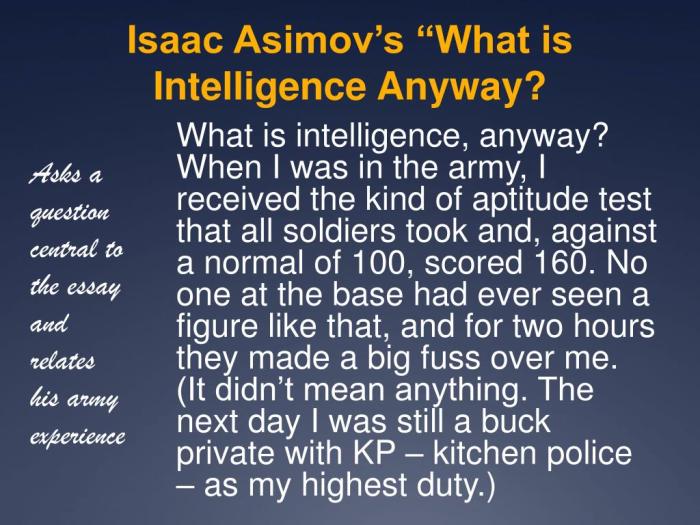What is intelligence anyway by isaac asimov – In his seminal essay “What is Intelligence Anyway?”, Isaac Asimov delves into the intricate and multifaceted nature of intelligence, offering a comprehensive analysis of its definitions, components, measurement, types, development, and the ongoing debate surrounding artificial intelligence versus human intelligence.
Asimov’s insights and perspectives on intelligence have significantly contributed to our understanding of this complex phenomenon, shaping the field of cognitive science and inspiring generations of researchers and thinkers.
Introduction: What Is Intelligence Anyway By Isaac Asimov

Intelligence, a complex and multifaceted concept, has intrigued philosophers, scientists, and psychologists for centuries. Isaac Asimov, a renowned science fiction writer and popular science author, delved into the nature of intelligence, offering his own unique perspectives and insights.
Definitions of Intelligence
Asimov’s definition of intelligence encompassed the ability to learn, solve problems, and adapt to changing circumstances. He believed that intelligence was not limited to cognitive abilities but also included emotional understanding and the capacity for empathy.
Components of Intelligence, What is intelligence anyway by isaac asimov
According to Asimov, intelligence consists of several key components, including memory, attention, and creativity. He emphasized the role of short-term memory in problem-solving and the importance of attention in focusing on relevant information.
Measurement of Intelligence
Asimov acknowledged the limitations of IQ tests as a sole measure of intelligence. He believed that intelligence is not a single, fixed entity but rather a dynamic construct that can vary depending on the context and the individual’s strengths and weaknesses.
Types of Intelligence
Asimov recognized the diversity of intelligence, suggesting that there are multiple types, including fluid intelligence (the ability to solve novel problems) and crystallized intelligence (accumulated knowledge and skills). He also discussed the importance of emotional intelligence in interpersonal relationships and decision-making.
Development of Intelligence
Asimov believed that intelligence develops through a combination of genetic factors and environmental influences. He emphasized the role of education and experiences in shaping an individual’s intellectual abilities.
Artificial Intelligence vs. Human Intelligence
Asimov explored the potential and limitations of artificial intelligence (AI), comparing it to human intelligence. He believed that while AI could surpass humans in certain tasks, it lacked the emotional depth, creativity, and consciousness that characterize human intelligence.
FAQ Guide
What is Asimov’s definition of intelligence?
Asimov defined intelligence as “the ability to learn and to apply knowledge.” He emphasized the importance of both acquiring new information and utilizing it effectively in problem-solving and decision-making.
How does Asimov distinguish between fluid and crystallized intelligence?
Fluid intelligence refers to the ability to think abstractly, solve novel problems, and adapt to new situations, while crystallized intelligence represents accumulated knowledge and skills that have been acquired through experience and education.
What factors influence the development of intelligence, according to Asimov?
Asimov recognized the complex interplay of genetics, environment, and education in shaping intelligence. He emphasized the importance of early childhood experiences and the role of social and cultural factors in fostering cognitive development.

